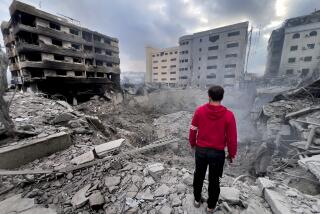Aoun Units Gain; Patriarch Asks Mercy : Lebanon: Appeals for a truce go unheeded as the general’s forces lay artillery barrage on rival Christian militia.
- Share via
NICOSIA, Cyprus — Attacking behind a creeping wall of heavy artillery fire, soldiers loyal to Maj. Gen. Michel Aoun pushed Friday toward the headquarters of the defiant Lebanese Forces militia in East Beirut, Christians against Christians in a bloody conflict unchecked by appeals for truce.
“Have mercy on people,” pleaded Patriarch Nasrallah Sfeir, primate of Lebanon’s Maronite Christians, in a message to the renegade general and militia commander Samir Geagea. “Their lives and their property are not yours. You must stop this mass massacre now. You must stop this mass suicide.”
Lebanese President Elias Hrawi, also a Christian, told a French radio interviewer he was prepared to use the military forces at his command in West Beirut to intervene against Aoun.
“I am waiting for an appeal from Geagea or his people. If it’s not tonight, it will be tomorrow,” the president declared.
There was no response from the general except continued shellfire. Fighting resumed early Friday with the collapse of yet another tentative cease-fire. Geagea, whose militia has established a state within a state in the Christian heartland, refused to bend to Aoun’s demand that his men disarm or join the army under his command.
“We are standing fast, and the general must know he is not allowed to wipe us out,” a Lebanese Forces communique declared. “We are shaking off one tank assault after another.”
Aoun’s forces outnumber Geagea’s at least 3 to 1 and have the heavier guns. Firing from hillside positions, the general’s artillery pounded militia forces in the Ashrafiyeh district of East Beirut and Geagea’s headquarters in Karantina along the nearby docklands. The militiamen answered with volleys of rockets from truck-mounted launchers, shooting and moving to escape the artillery fire.
Many of the victims were civilians, and Beirut press reports put the death toll at more than 100 in three days of fighting. Buildings blazed throughout the area. A fuel tank at Beirut’s main petroleum depot at Dora, just north of Karantina, exploded. Children were reported trapped in their school buildings, and morgues and hospitals were filled with the dead and wounded.
Stray shells continued to fall across the Green Line that separates Christian East Beirut from the predominantly Muslim-populated western sector. One fell in the district where Hrawi has lived since moving to Beirut last month from a Syrian-protected area in the Bekaa Valley.
“Lebanon is experiencing the most tragic phase today since the start of the (civil) war 15 years ago,” Hrawi was quoted as telling the French radio interviewer. He appealed for foreign intervention “to prevent Aoun from crucifying Lebanon and the Lebanese.”
The general has refused to recognize the authority of Hrawi, who was elected by the Lebanese Parliament last November under a political accord engineered by the Arab League. Aoun rejected the accord because it did not set a definite timetable for the withdrawal of the 40,000-man Syrian army from Lebanon.
When he was appointed acting prime minister in September, 1988, by outgoing President Amin Gemayel, the U.S.-trained general established a Christian Cabinet in the east, rivaled by a Muslim regime in West Beirut. Last February, he launched an armed campaign to drive the Syrians from Lebanon and has ruled his territory in uneasy alliance with the Lebanese Forces.
Aoun, son of a poor family who rose through the ranks of the Lebanese army, built a strong following among the Christians and many Muslims with his demand for a Syrian withdrawal from the country where they have been deployed since 1976. His reputation for modesty and honesty compares favorably with the militia, which, like Muslim militias in West Beirut and southern Lebanon, has amassed wealth through taxation of areas under its control.
But in the past year, rejecting compromise and the interfactional deals that are a hallmark of Lebanese politics, he has sounded more imperious. Last week, he shut down newspapers in East Beirut that referred to Hrawi as president.
More to Read
Sign up for Essential California
The most important California stories and recommendations in your inbox every morning.
You may occasionally receive promotional content from the Los Angeles Times.












